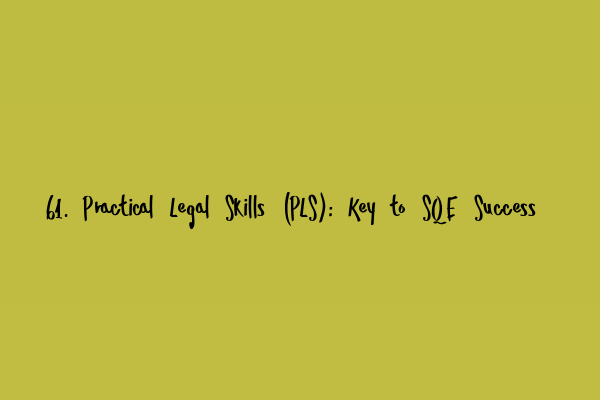61. Practical Legal Skills (PLS): Key to SQE Success
Welcome to SQE Exam Law, your one-stop resource for all things related to the Solicitors Qualifying Examination (SQE). In this article, we are going to discuss the importance of practical legal skills (PLS) and how they play a crucial role in your success on the SQE assessment.
Before we delve into the details, let’s take a moment to understand the SQE. The SQE is a two-part examination introduced by the Solicitors Regulation Authority (SRA) as a new route to qualify as a solicitor in England and Wales. Part 1 focuses on assessing candidates’ functioning legal knowledge, while Part 2 evaluates their practical legal skills.
When it comes to the SQE, many candidates tend to focus primarily on the legal knowledge component. However, it’s essential to recognize the significance of practical legal skills and dedicate adequate time and effort to develop and strengthen them.
What are Practical Legal Skills?
Practical Legal Skills encompass a range of core competencies that solicitors require to effectively practice law. These skills include legal research, legal writing, advocacy, drafting, interviewing, negotiation, problem-solving, and client care. Mastering these skills is essential for any lawyer, and they form the foundation of the SQE assessments.
The SRA has designed the SQE assessment to ensure that candidates possess the necessary practical legal skills to handle client matters competently and ethically. Therefore, it is crucial to focus on developing these skills throughout your preparation for the SQE.
Importance of Practical Legal Skills in the SQE
The SQE assessments evaluate candidates’ ability to apply their legal knowledge in various practical scenarios. It is not enough to know the law; you must also demonstrate the skills to navigate legal problems effectively.
By dedicating time to honing your practical legal skills, you give yourself an edge in the SQE assessments. The exams will not only test your legal knowledge but also assess your ability to analyze and apply the law to real-life scenarios. Practicing and refining these skills allow you to approach the exam questions with confidence and clarity.
How to Develop Practical Legal Skills
Developing practical legal skills requires a combination of theoretical knowledge, practice, and feedback. Here are some key strategies to help you enhance your PLS:
- Take advantage of practical training courses: Enroll in SQE-specific practical training courses that focus on different aspects of legal practice. These courses often provide hands-on training and simulated practice scenarios to help you develop and refine your practical legal skills. Such training will not only supplement your legal knowledge but also help you gain the confidence to tackle the SQE assessments successfully.
- Participate in mock assessments: By participating in mock assessments, you get a feel for the actual exam format and can practice applying your legal knowledge and skills under timed conditions. Mock assessments can also highlight areas where you may need further improvement and guide your future study plan.
- Seek feedback from experts: Engage with experienced legal professionals who can provide constructive feedback on your performance. Their insights will help you identify your strengths and weaknesses, allowing you to focus on areas that require improvement.
- Utilize technology-driven resources: Leverage technology-driven resources such as online webinars, e-learning platforms, and virtual practice environments to reinforce your practical legal skills. For instance, SQE webinars (check out our article on SQE Webinars: Expert Insights at Your Fingertips) can provide valuable insights from legal professionals and equip you with practical tips and techniques for success.
The Link Between Practical Legal Skills and Success on the SQE
Practical legal skills are not only crucial for success on the SQE assessments but also for a future career as a solicitor. The assessments aim to ensure that qualified solicitors possess the necessary skills to serve their clients effectively and ethically.
By investing time and effort into developing your practical legal skills, you not only increase your chances of passing the SQE assessments but also enhance your ability to excel in your legal career. Employers in the legal industry highly value candidates who possess strong practical skills, as these skills directly impact the effectiveness and efficiency with which legal matters are handled.
Conclusion
With the SQE assessments, the SRA aims to ensure that aspiring solicitors possess the necessary practical legal skills to excel in their careers. By recognizing the importance of practical legal skills and actively working on developing them, you set yourself up for success in both the exams and your future profession.
If you want to learn more about the SQE and how to succeed, make sure to check out our related articles:
- 23. Understanding the Grading System in SQE
- 24. Unlocking Knowledge with SQE Webinars: Expert Insights at Your Fingertips
- 17. Review of SQE Course Providers: Choosing the Best Fit
- 4. Unveiling the SRA Syllabus for the SQE
- 31. Conquer the SQE: Insider Tips and Study Tricks for Success
At SQE Exam Law, we provide comprehensive resources, guidance, and support to help you succeed on the SQE assessments. Stay tuned for more informative articles and updates!
